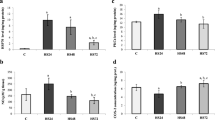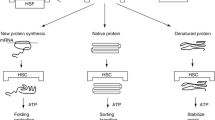Abstract
We previously reported that water-immersionstress specifically induced the synthesis of a 60-kDaheat-shock protein (HSP60, chaperonin homolog) inpancreatic cells and preinduction of HSP60 completely prevented development of cerulein-inducedpancreatitis in the rat in an HSP60 quantitativelydependent manner. In order to study the cytoprotectivefunction of a 72-kDa heat-shock protein (HSP72,stress-inducible hsp70), the effect of specific preinduction ofHSP72 by hyperthermia on cerulein-induced pancreatitiswas investigated and compared with the effect ofpreinduction of HSP60 in this study. Expression of HSP60 and HSP72 in the pancreas wasinvestigated by immunoblot before and after waterimmersion or hyperthermia. Following pretreatment withwater-immersion stress or hyperthermia, the rats wereinjected with cerulein (40 μg/kg, intraperitoneally).The pancreas wet weight and serum amylase concentrationwere measured before and after cerulein injection.Hyperthermia (42.5°C, 20 min) specifically induced HSP72 in the pancreas. The synthesis of HSP60was specifically induced by water-immersion stress inthe pancreas. Cerulein-induced pancreatitis was clearlyprevented by specific preinduction of HSP60 by water-immersion stress. However, preinductionof HSP72 by hyperthermia had no preventive effect oncerulein-induced pancreatitis. Our findings suggest thatHSP60 and HSP72 have distinct functions in the pancreas, and their induction mechanisms arealso different in vivo. These results could be importantfor understanding the mechanism of “adaptivecytoprotection” in the pancreas mediated byheat-shock proteins.
Similar content being viewed by others
REFERENCES
Yamaguchi H, Kimura T, Nawata H: Does stress play a role in the development of severe pancreatitis in rats? Gastroenterology 88:1682–1688, 1990
Takano S, Kimura T, Kawabuchi M, Yamaguchi H, Nawata H: Ultrastructural study of the effects of stress on the development of acute hemorrhagic pancreatitis in rats. Gastroenterol Jpn 26:236, 1991
Otaka M, Itoh H, Kuwabara T, Zeniya A, Fujimori S, Otani S, Tashima Y, Masamune O: Induction of heat shock protein and prevention of caerulein-induced pancreatitis by water-immersion stress in rats. Int J Biochem 26:805–811, 1994
Tissieres A, Mictchell HK, Tracy VM: Protein synthesis in salivary glands of Drosophila melanogaster: Relation to chromosome puffs. J Mol Biol 84:389–393, 1974
Hightower LE: Cultured animal cells exposed to amino acid analogues or puromycin rapidly synthesize several polypeptides. J Cell Physiol 102:407–427, 1980
Emami A, Schwartz JH, Borkan S: Transient ischemia or heat stress induced a cytoprotectant protein in rat kidney. Am J Physiol 260:479–485, 1991
Li GC, Li L, Liu RY, Rehman M, Lee WMF: Heat shock protein hsp70 protects cells from thermal stress even after deletion of its ATP-binding domain. Proc Natl Acad Sci USA 89:2036–2040, 1992
Lowry OH, Rosebrough NJ, Farr AL, Randall RJ: Protein measurements with the Folin phenol reagent. J Biol Chem 193:265–275, 1951
Laemmli UK: Cleavage of structural proteins during the assembly of the head of bacteriophage T4. Nature 227:680–685, 1970
Towbin H, Staehelin T, Gordon J: Electrophoretic transfer of proteins from polyacrylamide gels to nitrocellulose sheets: Procedure and some applications. Proc Natl Acad Sci USA 76:4350–4354, 1979
Otaka M, Itoh H, Kuwabara T, Zeniya A, Fujimori S, Tashima Y, Masamune O: Induction of a 60-kDa heat shock protein in rat pancreas by water-immersion stress. Int J Biochem 25:1769–1773, 1993
Otaka M, Itoh H, Kuwabara T, Zeniya A, Fujimori S, Otani S, Tashima Y, Masamune O: Induction of a 60-kDa heat shock protein and prevention of caerulein-induced pancreatitis by water-immersion stress. Gastroenterology 106:A312, 1994
Otaka M, Otani S, Kuwabara T, Zeniya A, Fujimori S, Itoh H, Tashima Y, Masamune O: Novel colorectal adenocarcinoma-associated 40-kDa and 47-kDa protein antigens recognized by anti-60-kDa heat shock protein antibody. J Clin Gastroenterol 21:224–229, 1995
Hirakawa H, Rokutan K, Kikawa T, Kishi K: Geranylgeranylacetone induces heat shock proteins in cultured guinea pig gastric mucosal cells and rat gastric mucosa. Gastroenterology 111:345–357, 1996
Wakui H, Itoh Y, Tashima Y, Kobayashi R, Nakamoto Y, Miura AB: Specific antibodies against the stress-inducible 72-kDa protein, a member of the heat-shock protein hsp72 in healthy human subjects. Int J Biochem 23:975–978, 1991
Hotchkiss R, Nunnally I, Lindquist S, Taulien J, Perdrizet G, Karl I: Hyperthermia protects mice against the lethal effects of endotoxin. Am J Physiol 265:R1447–R1457, 1993
Ceska M, Birath K, Brown B: A new and rapid method for the clinical determination of α-amylase activities in human serum and urine. Clin Chim Acta 26:437–444, 1969
Kaplan MH: Acute and chronic pancreatitis. The clinical implications of their acceptance as diseases of adaptation. Am J Gastroenterol 25:234–251, 1956
Nakai Y, Araki T, Takahashi S, Shimada A, Nakagawa T: Chronic pancreatitis as psychosomatic disorder. Psychother Psychosom 39:201–212, 1983
Takagi K, Kasuya Y, Watanabe K: Studies on the drugs for peptic ulcer. A reliable method for producing stress ulcer in rats. Chem Pharm Bull 12:465–472, 1964
Guth PH: Gastric blood flow in restraint stress. Am J Dig Dis 17:807–813, 1972
Robert A, Nezamis JE, Lancaster C, Hanchar AJ: Cytoprotection by prostaglandins in rats. Prevention of gastric necrosis produced by alcohol, HCl, NaOH, hypertonic NaCl, and thermal injury. Gastroenterology 77:433–443, 1979
Nakamura K, Rokutan K, Marui N, Aoike A, Kawai K: Induction of heat shock proteins and their implication in protection against ethanol-induced damage in cultured guinea pig gastric mucosal cells. Gastroenterology 101:161–166, 1991
Otaka M, Zeniya A, Fujimori S, Okuyama A, Jin M, Itoh S, Otani S, Tashima Y, Masamune O: Pre-induction of a 72-kDa heat shock protein prevents HCl-induced gastric mucosal lesion. Gastroenterology 110:A219, 1996
Zeniya A, Otaka M, Itoh H, Kuwabara T, Fujimori S, Otani S, Tashima Y, Masamune O: Induction and intracellular localization of a 72-kDa heat shock protein in rat gastric mucosa after water-immersion stress. J Gastroenterol 30:572–577, 1995
Otani S, Otaka M, Jin M, Okuyama A, Itoh S, Iwabuchi A, Sasahara H, Itoh H, Tashima Y, Masamune O: Effect of pre-induction of heat shock proteins on acetic acid-induced colitis in rats. Dig Dis Sci 42:833–846, 1997
Itoh H, Toyoshima I, Mizunuma H, Kobayahsi R, Tashima Y: Three-step purification method and characterization of the bovine brain 90-kDa heat shock protein. Arch Biochem Biophys 282:290–296, 1990
Cheng MY, Hartl F-U, Martin J, Pollock RA, Kalousek F, Neupert W, Hallberg RL, Horwich AL: Mitochondrial heat-shock protein hsp60 is essential for assembly of proteins imported into yeast mitochondria. Nature 337:620–625, 1989
Koll H, Guiard B, Rassow J, Ostermann J, Horwich AL, Neupert W, Hartl F-U: Antifolding activity of hsp60 couples protein import into the mitochondrial matrix with export to the intermembrane space. Cell 68:1163–1175, 1992
Koishi M, Hosokawa N, Sato M, Nakai A, Hirayoshi K, Hiraoka M, Abe M, Nagata K: Quercetin, an inhibitor of heat shock protein synthesis, inhibits the acquisition of thermotolerance in a human colon carcinoma cell line. Jpn J Cancer Res 83:1216–1222, 1992
Weber CK, Gress T, Müller-Pillasch F, Lerch MM, Weidenbach H, Adler G: Supramaximal secretagogue stimulation enhances heat shock protein expression in the rat pancreas. Pancreas 10:360–367, 1995
Itoh H, Kobayashi R, Wakui H, Komatsuda A, Ohtani H, Miura AB, Otaka M, Masamune O, Andoh H, Koyama K, Sato Y, Tashima Y: Mammalian 60-kDa stress protein (chaperonin homology). J Biol Chem 270:13429–13435, 1995
Rights and permissions
About this article
Cite this article
Otaka, M., Okuyama, A., Otani, S. et al. Differential Induction of HSP60 and HSP72 by Different Stress Situations in Rats (Correlation with Cerulein-Induced Pancreatitis). Dig Dis Sci 42, 1473–1479 (1997). https://doi.org/10.1023/A:1018866727129
Issue Date:
DOI: https://doi.org/10.1023/A:1018866727129




